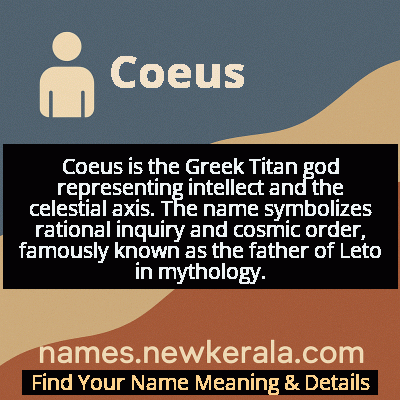Coeus Name Meaning & Details
Origin, Popularity, Numerology Analysis & Name Meaning of Coeus
Discover the origin, meaning, and cultural significance of the name COEUS. Delve into its historical roots and explore the lasting impact it has had on communities and traditions.
Name
Coeus
Gender
Male
Origin
Greek
Lucky Number
9
Meaning of the Name - Coeus
Coeus is the Greek Titan god representing intellect and the celestial axis. The name symbolizes rational inquiry and cosmic order, famously known as the father of Leto in mythology.
Coeus - Complete Numerology Analysis
Your Numerology Number
Based on Pythagorean Numerology System
Ruling Planet
Mars
Positive Nature
Generous, passionate, energetic, and humanitarian.
Negative Traits
Impulsive, impatient, moody, and can be overly emotional.
Lucky Colours
Red, maroon, scarlet.
Lucky Days
Tuesday.
Lucky Stones
Red coral, garnet.
Harmony Numbers
1, 2, 3, 6.
Best Suited Professions
Military, sports, philanthropy, leadership roles.
What People Like About You
Courage, energy, leadership, generosity.
Famous People Named Coeus
Coeus (Greek Mythology)
Titan God
One of the twelve Titans, personification of celestial axis and rational intelligence
Coeus (Literary Reference)
Mythological Figure
Featured in foundational Greek cosmogony as father of Leto and Asteria
Coeus (Academic Reference)
Mythological Archetype
Symbol of intellectual inquiry and cosmic order in mythological scholarship
Name Variations & International Equivalents
Click on blue names to explore their detailed meanings. Gray names with will be available soon.
Cultural & Historical Significance
In ancient Greek cosmology, Coeus represented the pillar of the north, with his name etymologically linked to questioning and inquiry, reflecting the Greek philosophical tradition that would later emerge. His mythological significance extends beyond mere genealogy, symbolizing the intellectual underpinnings of the cosmos and the transition from primal chaos to ordered rationality that characterized Greek philosophical thought. The cultural legacy of Coeus persists through classical literature and continues to influence modern understanding of Greek mythological structures.
Extended Personality Analysis
Individuals named Coeus are typically associated with intellectual depth, analytical thinking, and a strong sense of cosmic awareness. They often exhibit qualities of wisdom, curiosity, and a methodical approach to problem-solving, reflecting the Titan's domain over intellect and celestial order. These personalities tend to be contemplative, with a natural inclination toward philosophical inquiry and abstract thought.
Their strength lies in their ability to see patterns and connections that others might miss, making them excellent strategists and visionaries. However, they may sometimes struggle with emotional expression, as their rational nature can dominate their interpersonal relationships. The Coeus personality combines steadfast reliability with intellectual brilliance, often serving as pillars of wisdom in their communities while maintaining a certain cosmic detachment that allows for objective analysis of complex situations. This balance between deep thought and practical application makes them valued advisors and thinkers.
Modern Usage & Popularity
In contemporary times, Coeus remains an exceptionally rare given name, primarily used by classical enthusiasts, mythology aficionados, and parents seeking unique names with deep historical roots. Its usage is almost exclusively confined to academic circles, literary references, and specialized communities interested in Greek mythology. The name has not appeared in modern baby name registries or popularity charts, maintaining its status as a scholarly and esoteric choice. Recent interest in mythological names has seen a slight increase in awareness of Coeus, though it remains far less common than other Titan names like Atlas or Cronus. Its modern appeal lies in its intellectual connotations and connection to classical learning rather than mainstream naming trends, making it a distinctive choice for those valuing mythological heritage and cerebral qualities.
Symbolic & Spiritual Meanings
Coeus symbolizes the fundamental principles of intellectual inquiry, cosmic order, and the axis around which understanding revolves. Metaphorically, he represents the pillar of rationality that supports the structure of knowledge and the quest for understanding. His association with the celestial axis makes him a symbol of stability and orientation in both physical and intellectual realms. The name embodies the concept of questioning as a path to wisdom, reflecting the Greek philosophical tradition that valued inquiry above all. Coeus also symbolizes the transition from primal instinct to reasoned thought, serving as an archetype for the human journey toward enlightenment and ordered comprehension of the universe, making him an enduring symbol of the intellectual foundations upon which civilization builds its understanding of reality.

